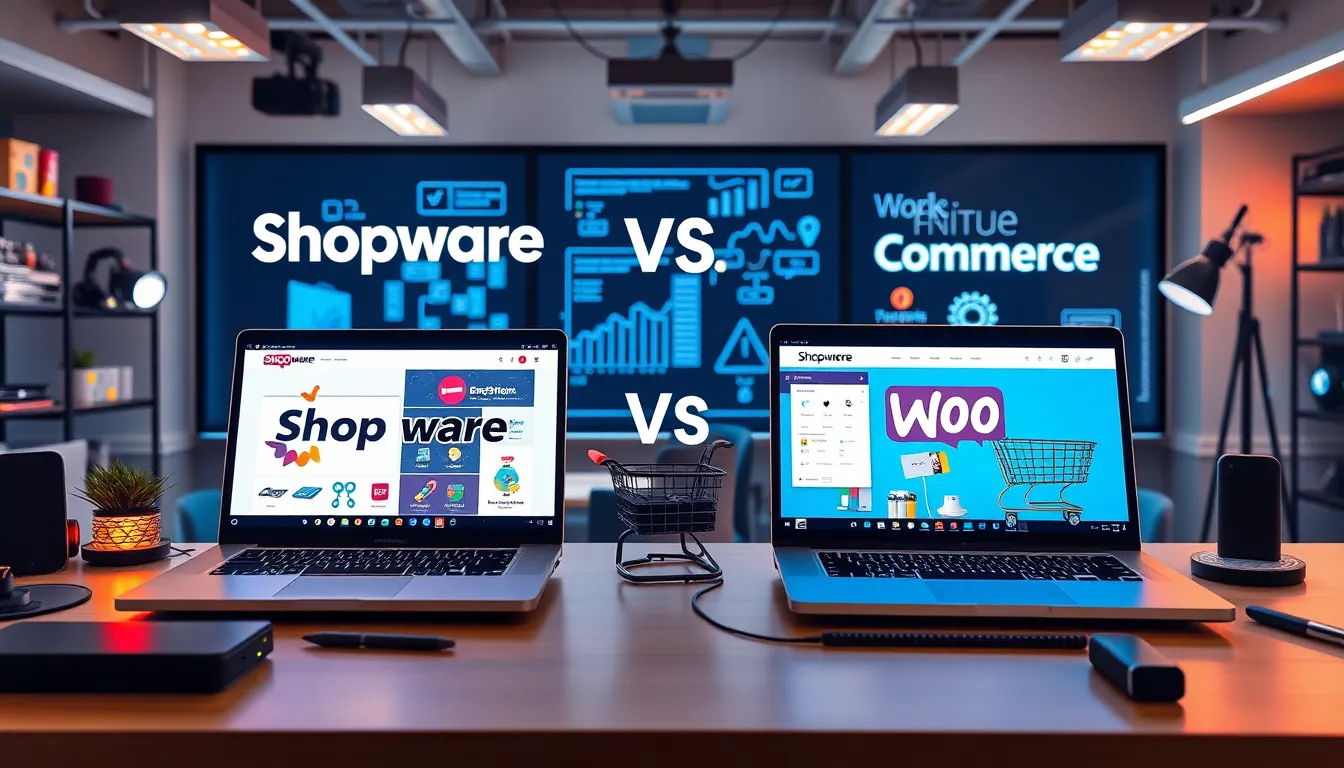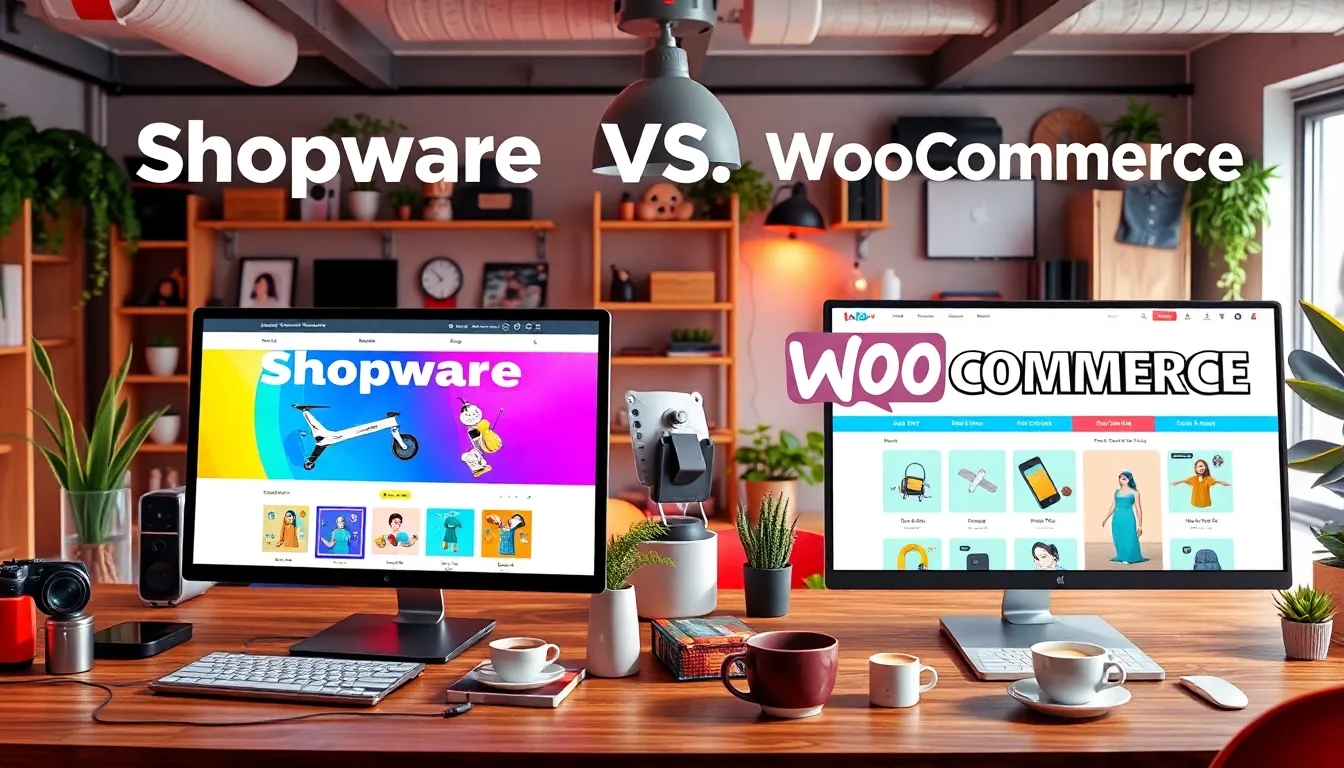Shopware WooCommerceTwo systems, two approaches - but which one suits your business better? Whether you're a beginner or a professional retailer: the decision depends heavily on how big your store is going to be, which functions you need and how much technical effort you can afford.

Key points
- ScalabilityShopware better suited for growth and large catalogs
- User friendliness: WooCommerce is easier to set up
- FunctionsShopware offers more extensive tools out of the box
- Cost structure: WooCommerce starts cheaper - in the long term, both can become similarly expensive
- Target groupWooCommerce for small retailers, Shopware for medium to large companies
User-friendliness in direct comparison
If you're already working with WordPress, you'll find yourself in WooCommerce quickly find your way around. The interface is familiar, the setup wizard guides you through the most important steps and many tutorials make it easy to get started. Small companies without any technical know-how benefit from this in particular.
Shopware relies on a modern, modular backend with many configuration options. The "worlds of experience" as a layout builder are convincing - but the setup is more complex. In return, you have more influence over the look and structure of your store. You need to plan more time for familiarization, but it pays off if your project is to grow.
Flexibility and customization options
WooCommerce is flexible - but tied to WordPress. You can use thousands of themes and plugins, but complex store structures quickly come up against functional limitations. If your project grows or has industry-specific requirements, standard solutions are often no longer sufficient.
Shopware offers you significantly more technical fields for customizations. Over 1,500 extensions in the official store, REST API access and a clear separation of front and back end provide you with the necessary structure for individual developments. B2B functions such as customer groups, graduated prices or interfaces to ERP and CRM systems are also easier to integrate.

Functions in detail: Who offers what?
WooCommerce covers the basics: creating products, managing orders, defining shipping methods - it works smoothly. However, you will quickly need paid plugins for advanced functions. Examples include subscription sales, warehouse management or multichannel integration. Some extensions cost 50-300 euros per year and require regular updates.
Shopware goes much further: marketing tools, vouchers, dynamic product groups and extensive SEO settings are already included in the Community version. In the Professional Edition, you also get functions such as the Rule Builder module, experience worlds with extended design options and the integration of digital products. This means that B2C and B2B needs can be fully covered.
Table: Function comparison Shopware vs WooCommerce
| Function | Shopware (Community/Professional) | WooCommerce |
|---|---|---|
| Products & variants | ✓ Very flexible | ✓ Easily expandable |
| Marketing tools | ✓ integrated | ➖ Plugin required |
| Worlds of experience / Page Builder | ✓ included | ➖ Theme-dependent |
| Multilingualism / multicurrency | ✓ on the system side | ➖ Plugin |
| B2B functions | ✓ depending on the license | ➖ elaborate |
| Interfaces (ERP, CRM) | ✓ Professionally expandable | ➖ Limited feasibility |

Scalability and performance for growing stores
Shopware was designed for load - regardless of whether you want to sell 1,000 or 100,000 items. The system uses Symfony and supports high-performance caching solutions and ElasticSearch. This means you are on the safe side even during traffic peaks. Larger stores with API connections or their own PIM system benefit from the modular technology.
WooCommerce is ideal for simple and medium-sized stores with little parallel traffic. However, performance depends heavily on the hosting and plugins used. Many extensions influence the loading times. If your project is larger, you should take a close look at the choice of hosting package - or consider a more powerful alternative such as Shopware. You can find a suitable technical basis in this Shopware Hosting Guide.
Cost analysis: What pays off in the long term?
WooCommerce starts free of charge. All you need is WordPress hosting, usually from 5-10 euros per month. The main costs come from plugins, themes and developer hours for special requests. In the long term, it pays off with low requirements, but expansion costs time and money.
Shopware also offers a free entry-level solution (Community Edition). However, most companies choose the professional version (from approx. 2,495 euros one-off) or a rental model. Hosting and support are more expensive, but you get structured features for growing stores. This can be worthwhile in the long term, especially for several employees in the backend or multichannel.

Which system is suitable for whom?
WooCommerce is perfect for self-employed people, start-ups or publishers who want to sell products on the side. The entry hurdle is low. As long as your store remains simple, you can get started and generate sales with little effort. For high flexibility on a small budget, take a look at these WordPress e-commerce plugins overview on.
Shopware is primarily used in medium-sized companies that operate e-commerce strategically. If you expect a large number of orders, international reach or multiple sales channels, Shopware is prepared. Functions such as product streams, campaign management or content commerce allow you to increase sales through structure, not compromises.
Security and updates
Data security is an often underestimated aspect of e-commerce. This is where both WooCommerce as well as Shopware with regular security updates. WooCommerce benefits from the broad WordPress developer community, which always reacts quickly to security vulnerabilities. However, plugins used should come from trustworthy providers and be updated regularly to minimize security risks. Shopware attaches great importance to keeping the core software robust. Thanks to a clear code structure, updates can often be carried out easily. As soon as a critical gap is discovered, the community reacts immediately and store operators can apply fixes in the form of updates straight away. Both systems require constant maintenance to ward off malware and hacker attacks. Those who choose a professional support or hosting solution are on the safe side here.
Support and community
The strength of a store system is reflected not least in the size and helpfulness of its user community. WooCommerce is documented in almost all languages due to its global distribution as a WordPress plugin. Countless forums, Facebook groups and blogs provide you with free information. Paid support services also exist, but are not centrally organized. Shopware also has an active community, particularly in German-speaking countries. The official forum helps with numerous questions, and specialized agencies are available for complex problems. Those who want to delve deeper into technical details or realize large projects can also rely on the Shopware Academy courses to obtain certifications. Both systems therefore offer a solid basis for long-term success.
Design and themes
At Design it is often the first impression that counts: A professional layout can convince potential customers right from the start. With WooCommerce you can choose from thousands of free and paid WordPress themes. This variety makes it easy for you to design visually appealing pages, but often requires additional CSS or page builder plugins. Shopware provides very modern standard themes with a clear separation between the front-end and back-end structure. This gives you creative freedom that is strongly geared towards professional requirements. If you only have a small budget, you can also find inexpensive or even free themes in the Marketplace. Thanks to Shopware's modular architecture, it is easier for developers to create individual layouts without constantly coming into conflict with the core system.
Mobile Commerce
In the B2C sector in particular, a large proportion of online shopping now takes place via smartphones and tablets. Both WooCommerce as well as Shopware offer responsive themes so that your products are displayed optimally on all devices. WooCommerce is increasingly focusing on compatibility with common WordPress themes, which are often already mobile-ready. Shopware follows a "mobile first" approach by default: the frontend adapts dynamically to different screen sizes without sacrificing speed or stability. This can be a decisive factor in preventing high bounce rates due to long loading times, especially for high-traffic stores.

Payment methods and payment providers
The growing number of payment options such as PayPal, credit cards and installment payments means that customers are becoming increasingly demanding. With WooCommerce you can integrate almost any common payment method thanks to numerous extensions. Many payment service providers provide official plugins, which keeps implementation simple. However, please note that any additional interface should be regularly maintained and updated. Shopware offers similar options, although some integrations are already provided directly in the system or certified as official plugins. This often shortens the training period and avoids conflicts between different providers. For stores with an international focus, country-specific payment options can also be easily adapted.
SEO potential and visibility
Visibility in search engines is a decisive factor for the success of an online store. WooCommerce benefits from the large WordPress SEO ecosystem. Plugins such as Yoast SEO or Rank Math offer integrated functions for optimizing meta tags, permalinks and structured data. However, you have to find your way around the sometimes complex settings. Shopware already comes with solid SEO functions in the core system that make it easier to maintain speaking URLs, meta information and canonical tags. This means that multilingual pages can also be structured without having to regulate every adaptation via a plugin. If you want extra fine-tuning, you can use additional extensions or implement specific SEO strategies via the REST API.
Migration and data import
If you are switching from an existing store system, the question of a smooth data import arises. WooCommerce offers simple import functions for CSV files so that you can integrate products, customers and orders. For more complex migration scenarios, however, you often need additional plugins or have to use middleware. Shopware has a migration wizard that supports frequently used store systems such as Magento, PrestaShop or older Shopware versions. In addition, complex data imports and exports can be flexibly configured via the API framework. This is particularly helpful if you have an established system landscape and need to transfer many data records correctly without having to edit them manually.
Automation and workflows
In e-commerce, it's not just the product presentation that counts, but also how efficiently you can design internal processes. WooCommerce offers various automation options via plugins, but if you have very specific requirements, it can be difficult to combine the right extensions. Especially if you want to set up automated processes for warehousing, accounting or returns processes, standardized plugins sometimes only integrate into your setup to a limited extent. Shopware provides you with a powerful framework in addition to the Rule Builder - in higher-value versions - with which you can largely automate dynamic price rules, discounts or connections to third-party systems. This is a huge advantage for fast-growing companies because processes are stabilized and less effort is required for manual maintenance.
Optimization and long-term store success
No matter which system you choose - in the end, it's the implementation that counts. Good loading times, clear product pages, clear conversion elements and a secure checkout increase success. It pays to fall back on proven principles here. You can find out which factors are decisive from a technical and psychological perspective in this article about Success factors for e-commerce.
You should also carry out regular updates, error checks and A/B tests. While WooCommerce is particularly flexible when it comes to content, Shopware enables structured automation - ideal for data-driven marketing.
My final impression
WooCommerce is ideal for a quick start if you are already using WordPress or are setting up a simple store without many functions. It keeps the entry costs low and can be expanded with plugins - but this can become a hurdle in the long term as you grow.
Shopware involves a little more initial effort, but pays off thanks to its structural depth. I recommend it to anyone who wants to scale their e-commerce project and is looking for performance, data structure and professional processes.




